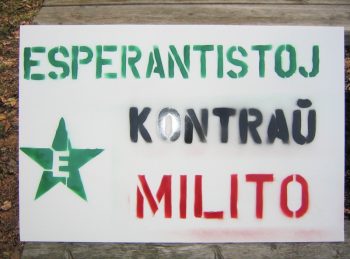Esperanto fun with Etymology Posted by Tomaso on May 8, 2017 in Uncategorized
Etymology is the study of word origins. Looking at where words come from can help us learn Esperanto, and learning Esperanto can help us understand where words come from. By special request, we’re going to be looking at some word origins. This will help you pick up some Esperanto vocabulary. It will also help you see how Esperanto is connected to English, as well as to other languages, and how you can use this knowledge to impress your friends. (Of course “subterranean” means sub la tero!)
Do any of the words in this sign remind you of words you know in English or other languages?
Esperanto and foreign languages
If you have learned another language before starting Esperanto, much of Esperanto’s vocabulary will look familiar. Bezoni (to need) looks like French besoin. Ŝranko (cupboard/closet) very clearly comes from German der Schrank. As you learn, you’ll find no end of connections like this. This is one way in which learning one language helps you learn a second.
Using English to help learn Esperanto
The connection of some Esperanto words to English is obvious and doesn’t need to be pointed out. Birdo, boato, and danci are pretty easy for English speakers to guess or learn. Other words aren’t as obvious, but once you see the connection, it’s hard to forget
Here’s a short list.
- lavi – to wash // lavatory – the place you wash your hands
- porti – to carry, wear // portable – able to be carried
- trovi – to find // treasure trove
- insulo – island // related to INSULation and penINSULa.
- dormi – to sleep // dormant, dormitory
Esperantistoj Kontraŭ Milito
In the photo above, we see the word “Esperantistoj” – which clearly means “Esperantists.” Kontraŭ (against) sounds like “contra dance” where the dancers stand opposite each other, or “contrary”. Milito (war) sounds like military.
In a discussion, someone pointed this last detail out with regard to the sentence below. I pointed out that every word in the example sentence has its origin outside of Esperanto.
“Ĉu la reĝo decidis, kion fari pri la milito? ”
- Ĉu (from a Polish question particle)
- la – known from many foreign expressions used in English, e.g. c’est la vie.
- reĝo – related to regicide, regal, and even royal.
- decidis – decide
- kion – starts with a K sound like the same word in many foreign expressions used in English such as quid or que.
- fari – related to “savoir faire”
- pri – related to periscope and periphery.
- milito – related to military
Helicopters, Snails, and Pterodactyls
The word helikoptero (helicopter) literally means “spiral wing.” We can think of the double helix as a kind of spiral, and this is related to heliko (snail.) The –ptero part of the word refers to the wing (flugilo in Esperanto) and shows up in words like fenikoptero (flamingo), koleoptero (beetle) – both winged animals – and more amusingly in pterodaktilo – an ancient reptile which flew with its “finger wing.” (“Dactylos/δακτυλος” means finger in Greek.) In Esperanto daktilo means “date” – a fruit which is said to look like a finger.
From your foot to your shorts and on the plate
The Esperanto word kalkano means heel. It’s related to the Latin word for boot (calceus). In a world where people wore togas, really tall boots (or stockings) were like pants. Eventually it lost the connection with the feet and left us with another Esperanto word kalsono or kalsoneto which can refer to swim trunks or underpants. This Latin word took a detour on the way and can be found on our dinner plates as well. Who doesn’t love a yummy calzone from the pizza shop? This is a stuffed pant leg.
What do you think?
What words are you having trouble learning. Can we find out where that word came from? Are there any Esperanto etymologies that you find especially interesting?

Build vocabulary, practice pronunciation, and more with Transparent Language Online. Available anytime, anywhere, on any device.





Comments:
Heather:
“Calcetines” is “socks” in Spanish.
Tomaso:
@Heather “Kalkaningo” ha ha ha.
Rob M:
I came across the Esperanto word “testudo” a while ago. I’d never seen it in Esperanto before (admittedly, I haven’t read that much) but knew what it meant straight away.
I like reading about ancient Rome…and their army. The army had a “testudo” formation which means tortoise formation.
Gotta love etymology.
Tomaso:
@Rob M I did not know that. Thanks for commenting.
I didn’t know this either (statue in MD named “Testudo”) — I think I feel a road trip coming on. 🙂
http://www.roadsideamerica.com/story/11456
Benson:
I like the trio of hieraŭ, hodiaŭ, and morgaŭ, because (if I’m not mistaken) they come from “hier” (French), “hodie” (Latin), and “Morgen” (German), respectively.
Tomaso:
@Benson You’re certainly not mistaken. Yeah, I can see why that’s interesting — a natural trio of words each from different source. That fits the “fun with etymology” motif.
Of course, that’s not much help for learners who don’t speak Latin, German, and French already. There is the obscure English word “hodiernal”. (Hodie coes from ho-die – not unlike to-day.)
“Morgaŭ” does indeed come from German, and is related to the English words “morn” and “morrow.”
“Hieroglyphics” does NOT mean “yesterday’s writing” – but wouldn’t it be neat if it did?
Laurent:
I also found fascinating the etymologies which can’t be identified. For example, where does “shati” come from ? Who introduced it ? Mi shatus scii.
Tomaso:
@Laurent Ŝati isn’t much of a mystery. It comes from German schätzen – to “esteem” or “treasure” something. What’s unusual is that the meaning of ŝati has changed over the years and now means exactly the same thing as plaĉi.
– Tio plaĉas al mi = mi ŝatas tion.